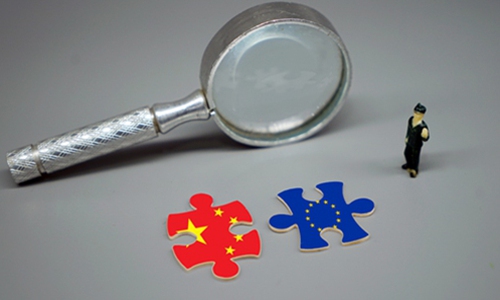EU economic actions reflect state interventions they decry
By Ding Yifan Source:Global Times Published: 2020/6/1 22:28:40

Photo: IC
When delivering a video speech on the occasion of annual German Ambassadors' Conference in late May, Josep Borrell, the European Union high representative for foreign affairs and security policy, said, "We need a more robust strategy for China, which also requires better relations with the rest of democratic Asia. That's why we must invest more in working with India, Japan, South Korea et cetera."
Although he also stressed, "As EU, we should follow our own interests and values and avoid being instrumentalized by one or the other," those with good sense all know that he was calling on EU countries to enhance cooperation with China's neighbors to offset China's regional influence.
If we look into this speech of the chief diplomat for the EU, we can find certain flaws.
First, what is "democratic Asia?" The current Indian system is largely inherited from the British colonial era. The systems of South Korea and Japan were also established by the Americans during the US occupation. Are Asian countries "democratic" only when their systems are defined by Westerners? Does democracy mean multi-party system and universal suffrage? Do public opinion and the opinion about the government really matter in "democratic countries?"
During the coronavirus pandemic, the publics' attitudes toward their leaders' governing abilities is telling. For example in the 2020 Edelman Trust Barometer report, eponymously released by the world's largest public relations firm Edelman, China scored 82, ranking the first among the 26 countries surveyed in terms of public trust. Meanwhile, in the US according to a Foreign Policy report, only 44 percent of people trust the government to care for their health.
Second, from the perspective of governing ability, those elected leaders cannot withstand tests. During the pandemic, the performance of some European leaders has triggered controversy among their people. The situation in the US is more worrying. In the world's most powerful "democratic country," partisanship has been put above the virus fight. The virus battle, which is supposed to unite the people, has become an excuse for politicians to pass the buck. When political infighting overrides people's lives, citizens should ask: what is the use of democracy?
Third, China has played an indispensable and active role in the global fight against the COVID-19 pandemic. China has provided countries and regions around the world with 56.8 billion surgical masks, 250 million protective gowns, tens of thousands of ventilators, and other important medical supplies - exemplifying its responsible use of its supply chain and logistics prowess.
How many European countries dare say that they can defeat the epidemic without using medical supplies offered by China?
Frankly speaking, Borrell called on the EU to increase investment in countries surrounding China with an attempt to wedge the country in. The pandemic has strengthened the perception of some political elites in major European countries that they rely too much on China. In essence, they want to use non-market means to reverse such trends.
Therefore, state interventionism is quietly resurging. Political figures are calling for legislation to ban Chinese companies from investing in and acquiring companies in their countries. They also demand their countries to offer bailouts to companies - even to nationalize them if necessary. In this way, Europe and China will have more in common in the future. This irony means European politicians have no grounds to accuse Chinese state-owned enterprises of violating market competition as they themselves are attempting to do right now in their domestic spheres.
China has attracted a considerable amount of foreign investment over the past decades. They are reading this way because China has gradually improved its investment environment. It's also a result of China's huge market attractiveness and the willingness of Western enterprises to follow market rules. If European politicians, out of geopolitical or ideological considerations, use administrative or legal means to force European enterprises to act against market rules, they may gain short-term private benefits. But this will destroy European companies and their economies in the long run.
According to the Business Confidence Survey 2019 released by the European Union Chamber of Commerce in China in May 2019, about 40 percent of European companies saw increased market access in their respective industries. It notes that 62 percent of the respondents view China among the top three current and future investment destinations. This shows EU companies endorsement and confidence in China's investment environment.
Whatever the US and EU would do to hedge China's development in Asia, the rejuvenation of the Chinese nation cannot be stopped. European political elites who are stuck in Eurocentrism should review the history of China-Europe exchanges. They need to have a sober understanding of the developmental trends of the bilateral relations.
The author is a professor at Beijing Foreign Studies University. opinion@globaltimes.com.cn
Posted in: VIEWPOINT,CHINA-EUROPE